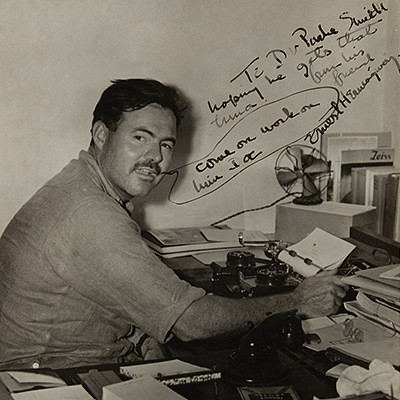Ernest Hemingway Letter on Writing, Bullfights, and The Sun Also Rises
Two ways to bid:
- Leave a max absentee bid and the platform will bid on your behalf up to your maximum bid during the live auction.
- Bid live during the auction and your bids will be submitted real-time to the auctioneer.
Bid Increments
| Price | Bid Increment |
|---|---|
| $0 | $5 |
| $50 | $10 |
| $200 | $25 |
| $500 | $50 |
About Auction
Sep 13, 2023
RR Auction support@rrauction.com
- Lot Description
ALS signed “Papa,” two pages, 8.25 x 10.75, July 5, 1953. Handwritten letter to his friend, author and screenwriter Peter Viertel, which finds Hemingway in Spain, commenting on his itinerary, bullfights, and Viertel's new book, White Hunter Black Heart. In part: “Sorry you couldn’t make it today. We will be at Lecumberri on the road Hendaye - Irun - Tolosa - Lecumberri - Pamplona. It is 35 kilometers out of Pamplona. Can’t give you the name of the hotel as Rupert and Tommy have gone to a fight (bull) in Bordeaux and we are shoving off for Hendaye now. Had a lovely trip down in spite of the rain — always some clearing up of the sky and on the best stretches. Fights are 7th - 8th - 9th - 10th - 12th. Sounds pretty good.
I’m nearly through the book and like it very much. Wish I had been around when you made some decisions (Technical). But I wasn’t. Maybe I will be sometime. It is a new way to write: to make reportage into literature. You do it very well and you write good now. So much better than the 2nd book. You’ve lost the magic of the first book but you replace it with metier and knowledge. Only sometimes you throw instead of pitching. This is what I mean: In the Sun Also the narrator is a completely invented guy. It is first person; but he is entirely imagined. An imagined guy, invented from knowledge, is much stronger and convincing than a described guy or any autobiography and that goes for them all. I mean autobiographies. You invent John into something really convincing.” Vertically, along the right margin, Hemingway adds “(unfortunately, in real life, I never felt his magic).”
He continues: “Taking the stuff out of context for Colliers gave me a completely false impression of the book. It is damned good. The criticism is only what I would give you on a ball game that some other friend would say you pitched perfectly. Hope you get down. Weather still miserable but the track not too heavy. We go back to Hendaye now to get an early sleep, we finish the book and see Spain fresh tomorrow. I hate to finish it because it is such a pleasure to read.” Hemingway signs vertically along the right margin and adds, “Trip was comfortable and all the side cuts good.” In fine condition.
This thoughtful Hemingway letter finds the writer returning to Spain after a hiatus of nearly 15 years, arriving on July 3rd and staying for the rest of the month. This was followed by a visit of five days in 1954 and 58 days in 1956; the motive for these three trips to Spain was to prepare an appendix for an updated edition of his 1932 bullfighting book Death in the Afternoon.
While the letter’s proximity to Hemingway’s reception of the Pulitzer Prize for Fiction is most certainly of import — he was awarded the prize for his landmark 1952 novella The Old Man and the Sea — the relationship between Hemingway and the recipient, Peter Viertel, is also quite fascinating, if not a bit complicated. Viertel, who met Hemingway in Ketchum, Idaho, in 1948, later wrote the screenplays for Hemingway’s novels The Old Man and the Sea and The Sun Also Rises, and, in 1992, published his memoirs entitled Dangerous Friends: At Large with Huston and Hemingway in the Fifties. Viertel’s book alluded to a possible romantic relationship between Hemingway and the author’s wife, Jigee, which was later confirmed when four secret love letters came up for auction. In spite of Hemingway’s impassioned text, Viertel’s own impression of the relationship, as biographer Jeffrey Meyers puts it, was that Hemingway was ‘more in love with the idea of love than with the actual woman, and his painful passion for Jigee was probably not consummated.’ - Shipping Info
-
Bidder is liable for shipping and handling and providing accurate information as to shipping or delivery locations and arranging for such. RR Auction is unable to combine purchases from other auctions or affiliates into one package for shipping purposes. Lots won will be shipped in a commercially reasonable time after payment in good funds for the merchandise and the shipping fees are received or credit extended, except when third-party shipment occurs. Bidder agrees that service and handling charges related to shipping items which are not pre-paid may be charged to a credit card on file with RR Auction. Successful international Bidders shall provide written shipping instructions, including specified Customs declarations, to RR Auction for any lots to be delivered outside of the United States. NOTE: Declaration value shall be the item’(s) hammer price and RR Auction shall use the correct harmonized code for the lot. Domestic Bidders on lots designated for third-party shipment must designate the common carrier, accept risk of loss, and prepay shipping costs.
-
- Buyer's Premium



 EUR
EUR CAD
CAD AUD
AUD GBP
GBP MXN
MXN HKD
HKD CNY
CNY MYR
MYR SEK
SEK SGD
SGD CHF
CHF THB
THB













